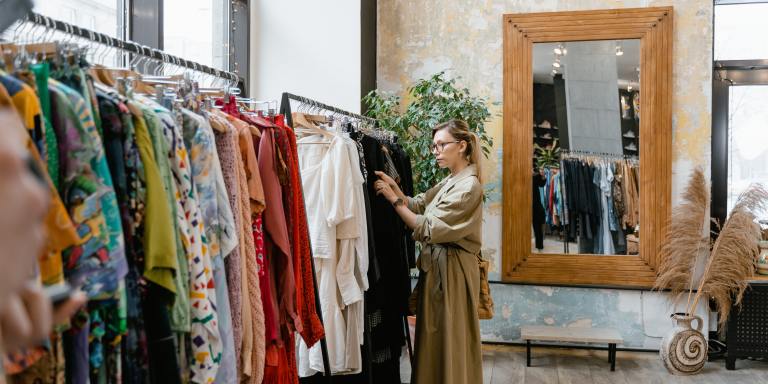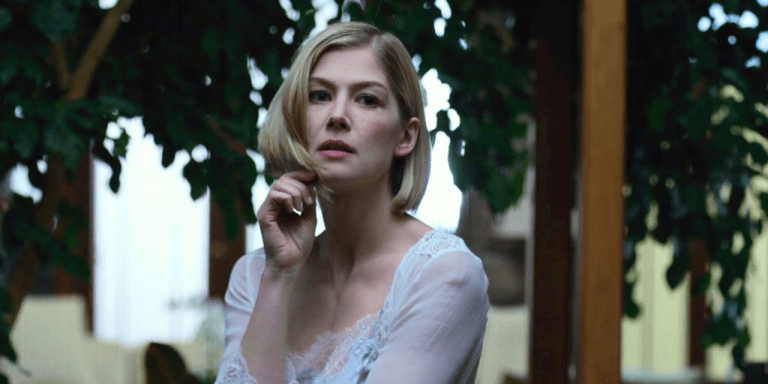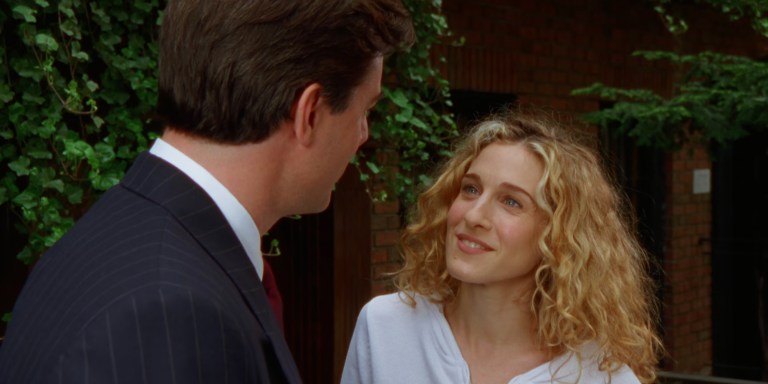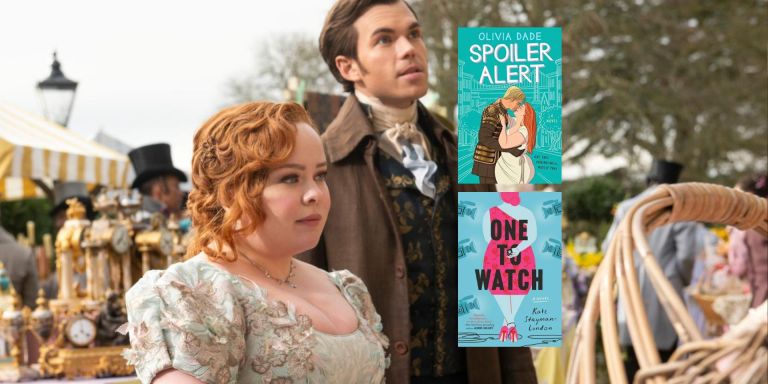Amidst all the controversy surrounding Kim Kardashian’s Vogue cover this month — and if you’re somehow unaware that there has been a controversy, I am endlessly jealous of you — Kim made one offhand comment that particularly stuck out to me. She said that, during her shoot, she felt like she was having her “Carrie Bradshaw moment,” an innocent enough statement that makes sense given the context. Carrie (on top of working with Vogue) did a photoshoot in various white, designer gowns, months before her own wedding. It’s easy to understand how Kim made the connection.
But it was also jarring, a reminder that in 2014 we still associate those glamorous, thrilling moments of success with Carrie Bradshaw and the kind of life she represents. We still think of ourselves as having “Carrie moments,” when we look beautiful and have accomplished something great. Even I have caught myself feeling that way, seeing my book on a table in a store, or looking out the window of my apartment with a laptop and a glass of wine. Those moments in my life, no matter how much I didn’t like Carrie in practice, always felt like I was channeling her, instead of living my own life.
Carrie has become an enormous icon for women, like Marilyn Monroe or Audrey Hepburn-circa-the-poster-in-every-freshman-girl’s-dorm-room. And while we can argue that it’s more healthy to idolize a fictional character with no bearing on the real world, rather than someone like Marilyn whose life was fraught with trauma and depression, the idea of Carrie Bradshaw seems built on all of the very worst stereotypes of femininity.
For starters, few characters have ever been more practically irresponsible than her. When she is left with no choice but to essentially pawn her friend’s engagement ring to not be evicted, because she put tens of thousands of dollars into designer shoes, we are mostly relieved and charmed that her friend would come through for her after a little light scolding. The financial situation that Carrie had put herself in — desperate, totally unprepared, a teenager in her mid 30s — was neatly put away in a single episode. She would go on to wear even more extravagant clothes, snag her investment banker, and we would never really think of it again.
In fact, part of her storyline — with the exception of the financial power shift she felt with Berger — has always been “live a certain lifestyle through your attractive, wealthy boyfriend.” Aidan more or less purchased her a home. The Russian treated her to elegant gowns and nights at the opera and a nebulous life in France that didn’t require her to work and somehow supplied her with a personal driver. And then, of course, there was Big.
And Big is, inarguably, one of the worst possible examples of romance we could give the young, hopeful women watching this show. While Steve and Smith and Harry, despite their flaws, offered an unconditional, supportive love to their partners, Big spent most of the series evading and denying Carrie any kind of closeness. Nearly every woman I know, when chasing after a man that felt a bit out of her league and disinterested, thought of him at some point as her “Big.” He represents that love we must conquer over years and years of hard work. He is the man that we work for, despite him treating us in an objectively terrible way, because his rejection is sweeter than any other man’s acceptance.
In fact, his occasional interest in her didn’t just lead her to cheat or abandon personal projects, but to make deep emotional rifts with her best friends. And yes, Carrie is the central character to the show, but her selfishness when it came to the needs of her friends — no matter how much they supported her — was an inexcusable flaw. She dropped them for boyfriends, for impromptu trips, to go on monologues about her own personal problems when they were suffering from infertility or cancer. And when she did listen, her responses were always peppered with the kind of offhand judgment that she never accepted herself.
Even her friends’ sex lives weren’t free from judgment. Despite being a sex columnist, and having, if nothing else, a significant amount of partners, Carrie was surprisingly prude. She let her judgments of Samantha bubble up nearly once per season, and wasn’t afraid to draw lines around the kind of sex she considered “appropriate.” She didn’t want to be thought of a certain way for sleeping with Big on the first night, but felt comfortable in judging each one of her friends for a sexual activity they engaged in.
Of course, she isn’t the worst character to ever exist on screen. She isn’t malicious, after all, just deeply selfish and childish. But she is one of the few characters who has managed to transcend her show and brand, becoming almost a cultural shorthand for the glittery, exciting moments in any woman’s life. When we go in for that big job interview, or buy a fabulous pair of shoes, or fall in love with a man who maybe can’t love us back, we all feel like Carrie. We forgive her and identify with her and want everyone to work out as magically for us as it did for her.
But there is something cynical about Carrie, too. Over the course of the show (and let’s not even address the movies, I don’t accept them as canon), she managed to hit nearly every note of regressive “womanhood” that you could possibly inject into one character. She was shallow, superficial, clothes-obsessed, emotionally needy, financially illiterate, and more concerned with the man she was or wasn’t dating than literally anything else in her life. Carrie Bradshaw often feels like the Barbie doll that someone who doesn’t particularly like women was playing with, complaining in her Dream House as she waited for Ken to call her back.
Every time I find myself feeling, like Kim Kardashian, in the middle of a “Carrie moment,” I force myself to think about what that means. As much as I love the show, I can’t help but feel it wasn’t the best thing for me to be watching in my formative adolescent years, that it taught me many things about womanhood that it will take me years to fully unlearn. I often have to put away the adorable dress or shoes, because I know that — no matter what my inner Carrie would say — an investment banker isn’t going to magically come by and take care of my rent. There is nothing fabulous or glamorous about living in self-imposed perpetual childhood.
Even if the shoes are, objectively, really fucking cute. ![]()






